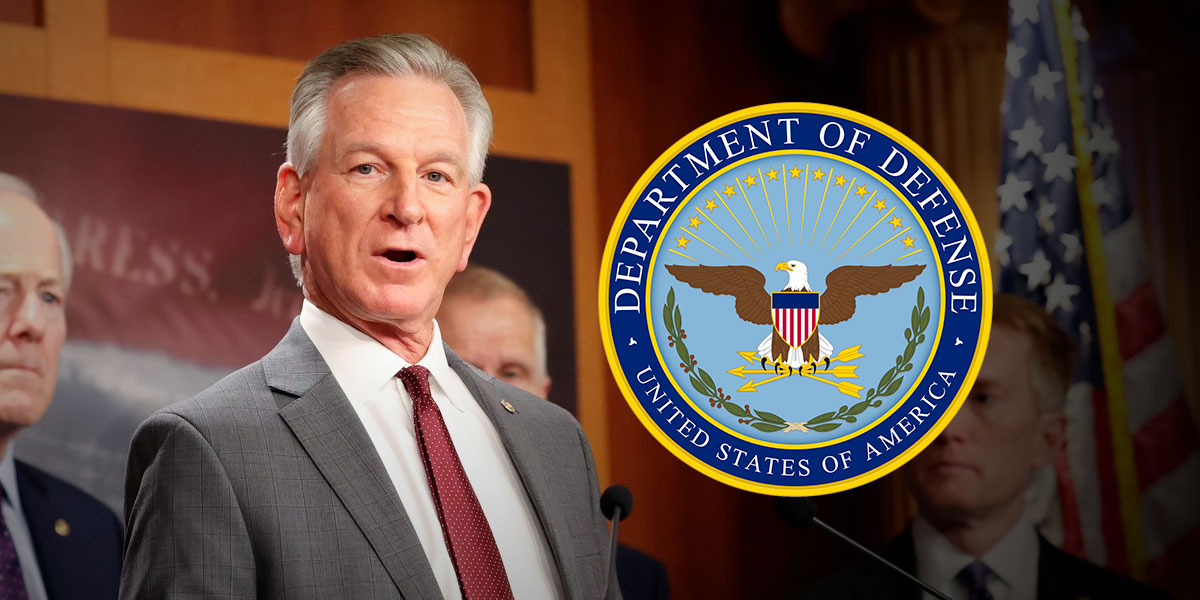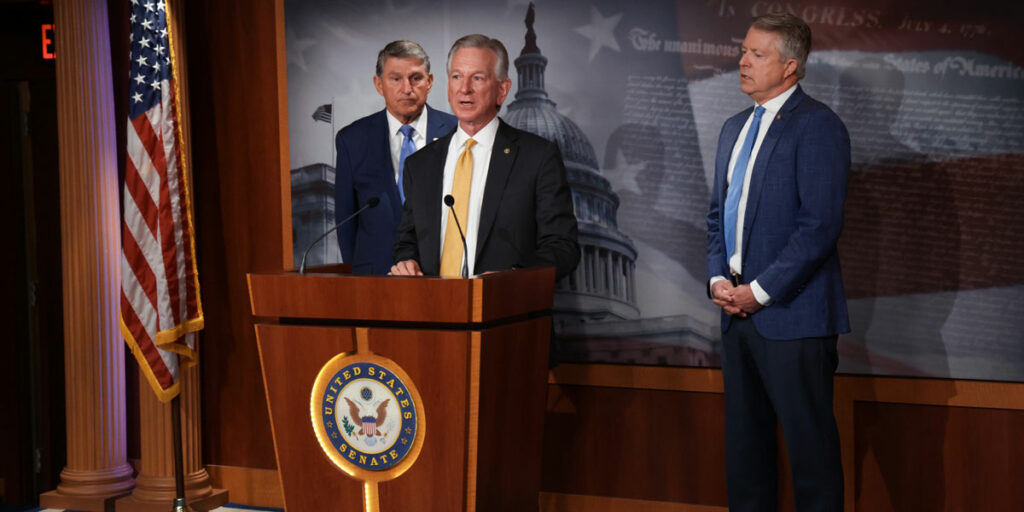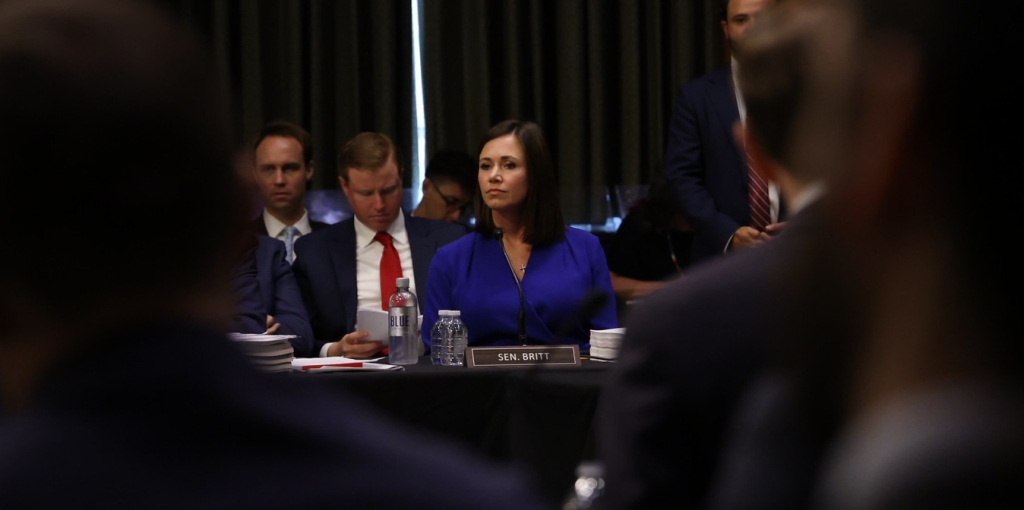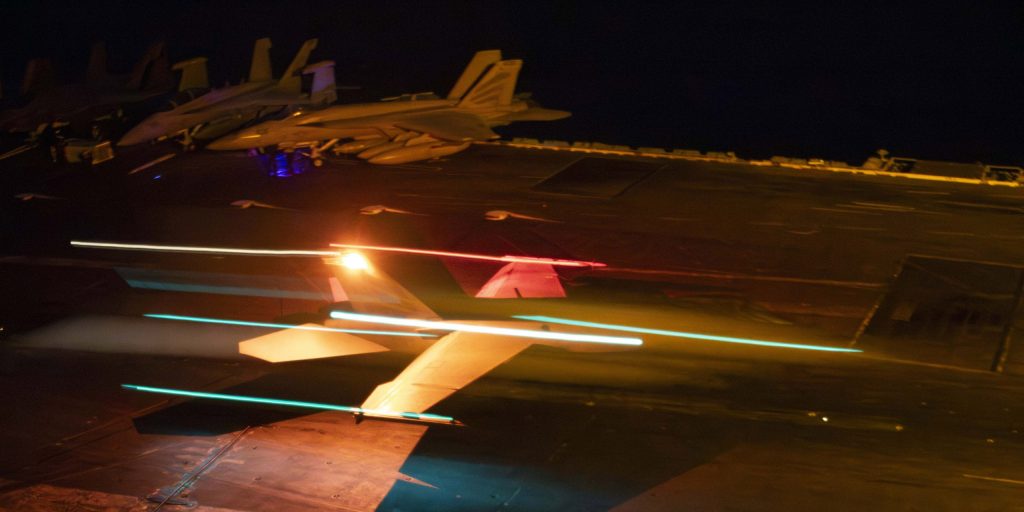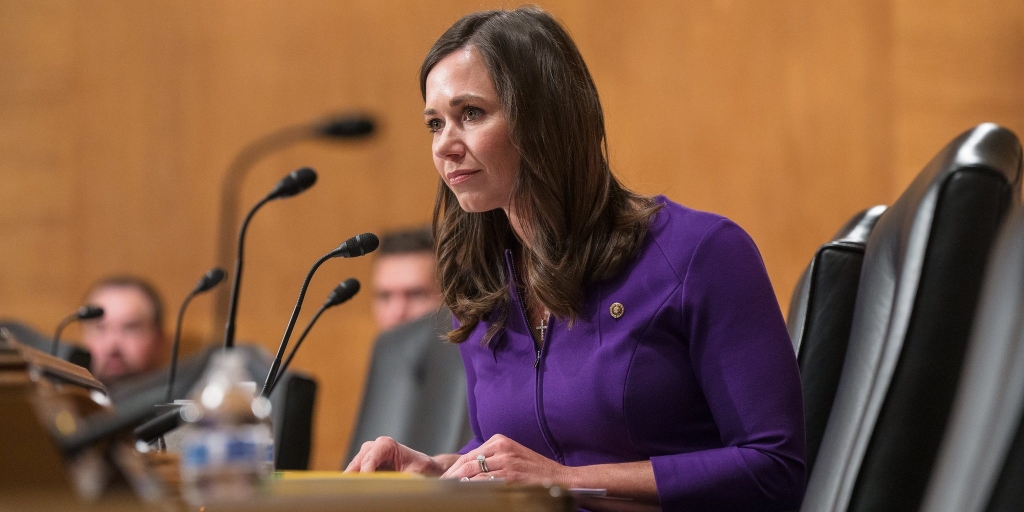As a member of the Senate Armed Services Committee, Sen. Tommy Tuberville plays a key role in U.S. defense, including appropriations to aid Alabama’s efforts in the security of the U.S. homeland.
He joined his colleagues recently to pass the FY25 National Defense Authorization Act (NDAA), which authorizes funding and provides guidance for policy at the Department of Defense.
“I am proud of the conservative wins we were able to deliver in this year’s NDAA for Alabama and our great military,” said Tuberville (R-Auburn). “Under Joe Biden, the Pentagon has been more focused on woke politics than on being a lethal killing machine. I am confident that President Trump and Pete Hegseth will refocus the DOD on its stated mission of deterring war and protecting the security of the United States.
“Alabama is authorized more than $1 billion in critical funding to support our bases, troops, facilities, and the defense industrial base. I look forward to next year’s negotiations when both chambers of Congress and the Executive branch can fully work together to restore peace through strength under President Trump.”
Tuberville is also a member of the Senate Aging, Agriculture, Veterans’ Affairs, and HELP committees.
Following is a brief breakdown of some of the most important provisions in the bill.
Slashing woke funding and promoting a warfighting agenda
- Prohibits DOD from paying for puberty-blockers and other drugs that could sterilize children.
- Eliminates funding for DEI programs and repurposing those funds to be used for counterdrug initiatives and countering transnational organized crime to obstruct the flow of illegal aliens and illicit drugs.
- Extends DEI hiring freeze and prevents DOD from establishing any new positions or filling any open DEI positions until the GAO completes an investigation of the Pentagon’s DEI programs.
- Authorizes President Trump’s Secretary of Defense to ban requiring “diversity statements” from service academy faculty applications.
- Prohibits DOD personnel from promoting and training using Critical Race Theory.
- Requires all newly commissioned officers to receive training on the U.S. Constitution.
- Stops Democrats’ attempts to revise military annual medical screening forms to include pro-abortion information.
Investing in Alabama
- Supports Redstone Arsenal, Fort Novosel, and Anniston Army Dept by securing over $300 million in funding:
- $40 million for the continued construction of Ground Test Facility Infrastructure.
- $20 million for Defense in Depth as Mission Assurance for Spacecraft Multilevel Security.
- $3 million for Virtual Integrated Testbed and Lab (VITAL) for Trusted Artificial Intelligence Operations (TAO).
- $120 million for Missile Defense Agency special programs.
- $56 million to construct a power generation and microgrid project.
- $3 million to design general purpose warehouse at Anniston Army Depot.
- $14 million to design a small arms warehouse.
- $13.5 million for the Missile Defense Agency’s infrastructure modernization initiative.
- Increased funding for procurement of PIM combat vehicles, which are made at Vehicle Upgrade and Overhaul Center (VUOC) in Anniston, AL.
- Increased funding for procurement of Abrams tanks, which are refurbished at the Anniston Army Depot.
- Increased funding for RDT&E for Stryker Modernization, which are refurbished at the Anniston Army Depot.
- Securing Army aviation funding to help Novosel’s ability to survive and execute missions with cyber and electromagnetic threats.
- Strengthens Alabama’s Missile Defense by securing over $725 million in funding:
- $250 million to restore SM-3 IB production.
- $176 million for an additional AN/TPY-2 radar Antenna Equipment Unit.
- $167 million for an additional Patriot launcher.
- $65 million to expand SM-3 IIA production.
- $33.5 million for the development of disruptive technologies.
- $15.5 million for sensors modeling and simulation.
- $3 million for Kinetic, Non-Kinetic Resource Optimization.
- $3 million for Artificial Intelligence Decision Aids for All Domain Operations.
- $10 million for Advanced Reactive Target Simulation.
- $3 million for Hypersonic Kill Vehicle Hardware-In-The-Loop.
- Invests in Maxwell Air Force Base and Alabama Ship Manufacturing by:
- Urging the Air Force to require congressional notification if a delay is expected for the MH-139A aircraft located on base—providing rapid response against threats to our land-based Intercontinental Ballistic Missile infrastructure.
- Expanding Navy Shipbuilding at Austal USA in Mobile, AL to include a 2nd Virginia-Class Submarine in FY25.
- Authorizes increased funding to enhance the submarine industrial base.
- Drastically improves Navy focus on unmanned surface and subsurface vessels.
Taking care of service members
- Authorizes funding to support a 14.5% pay raise for junior enlisted servicemembers (E1-E3) and a 4.5% pay raise for all other military members.
- Increases the number of required Junior Reserve Officers’ Training Corps (JROTC) units nationwide to help with military recruitment crisis.
- Increases facility sustainment funding by requiring the Department of Defense to adhere to the industry standard of 4% of a facility’s plant replacement value.
- Requires the Secretary of Defense to allow for teachers at overseas Department of Defense Education Activity (DODEA) schools to transfer to alternate DODEA schools—making it easier for military spouse teachers to find and maintain employment.
- Supports employee stock ownership plans (ESOP) that provide products and services to the DOD.
Increasing oversight
- Elevates the DOD’s Performance Improvement Officer to improve outcomes, drive efficiencies, and supercharge the Strategic Management Plan.
- Requires DOD to accelerate the adoption of AI and automation for audit purposes, following the DOD’s seventh failed audit.
- Requires the Secretary of Defense to review existing war plans and report to Congress on U.S. military shortfalls if adversaries decided to attack simultaneously or if the U.S. is forced to engage in protracted warfare.
- Streamlines bureaucracy by reinforcing rapid acquisition for DOD weapons programs and expanding production for critical minerals.
Investing in domestic production
- Creates a pilot program to commercially produce munitions.
- Includes funding for a 100% domestically produced battery that is American sourced, durable, reliable, and cheaper than that of foreign nations—lessening dependency on China.
- Increases funding for the development of cost-effective Counter-UAS technology.
- Supports Alabama’s textile manufacturing industrial base.
- Requires an assessment of the munitions disposal process to better protect workers and local communities in Alabama.
Fighting foreign influence
- Directs the Secretary of Defense to brief the congressional defense committees on the dominance of the battery market by foreign entities of concern and urges production of domestic batteries and battery material to meet our national security needs.
- Prohibits the sale of goods at DOD commissaries and exchanges from any entities that have or are engaged in the boycott of Israel.
- Prohibits universities and researchers from receiving DOD funds if they work with Chinese, Russian, or Iranian entities.
- Provides support for our ally, Israel, with U.S.-Israel counter tunneling cooperation.
- Increases $47.5 million for Israel cooperation on emerging technology.
- Authorizes $300 million in security assistance funds for the Trump administration to support Taiwan’s defense reforms.
- Secures funding to improve U.S. on-orbit satellite communication to keep pace with our adversaries.




